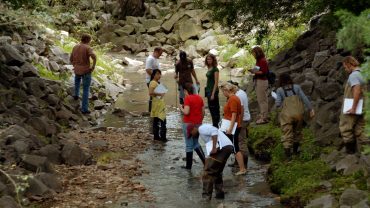Biological and Agricultural Engineering
The Master of Biological and Agricultural Engineering (MBAE) is intended for working professionals who seek advanced study beyond the undergraduate level but are not interested in pursuing a career in research. This program is currently focused toward environmental engineering, but bioprocess engineering interests can be accommodated as well. The master's degree requires 30 credit hours; a thesis is not required.
Eligibility
Admission is granted by the Graduate School upon recommendation of the BAE Director of Graduate Programs. Applicants must hold a B.S. degree from an accredited undergraduate engineering program with an overall GPA of 2.8 and a major GPA of 3.0. Applicants not meeting the requirements for full admission may be granted provisional admission.
All applicants must submit:
- Final transcript of baccalaureate program
- Letters of reference
- A clear and concise statement of interest
Plan of Study
Students must complete at least 30 credit hours of graduate credit, at least 20 credit hours of which must be at the 500 or 600 level. Up to three credit hours of Special Topics (BAE 610) or Special Problems (BAE 620) will be allowed.
All students must include a minimum of three hours of mathematics, statistics, and/or biomathematics at the 400-level or higher. Moreover, each MBAE program must show 15 hours of 400-level (or greater) engineering courses, either on the undergraduate transcript or the student's plan of work. These courses must have engineering content and must be taught from an engineering perspective.
Each student must submit a plan of work outlining the 30 credit hours which will be included in his or her program.
Normally, students in the MBAE program are self-supported. Since self-supported students may take as many as 12 credit hours of course work per semester, the MBAE can be completed in as little as three semesters (one and a half years).
Career Prospects
Biological and agricultural engineers specialize in areas such as environmental engineering and bioprocess engineering. They develop ways to conserve soil and water and to improve the processing of agricultural products. Environmental engineers are involved in water and air pollution control, ecosystem maintenance, recycling, waste disposal, and public health issues.
